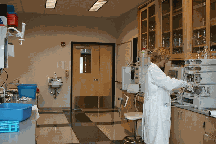 The photograph to the left shows Elisabeth working on one of the high-performance-liquid-chromatography systems in our laboratory.
The photograph to the left shows Elisabeth working on one of the high-performance-liquid-chromatography systems in our laboratory.
 Low-molecular-weight (LMW) organic acids (OA) are part of many biochemical pathways and are known to be very biologically labile, i.e. they are taken up rapidly by bacteria. Examples of LMW OA are acetate (also known as acetic acid) and propionate. Due to the high biological lability, it is likely that LMW OA support a substantial fraction of bacterial carbon demand in the ocean. However, presently we do not have methods sensitive enough for seawater analyses to investigate this hypothesis. Elisabeth is working on a method that involves tagging the organic acid with a fluorescent “tail”, called a coumarin. Making the acids fluoresce will make possible determinations of very low concentrations of organic acids.
Low-molecular-weight (LMW) organic acids (OA) are part of many biochemical pathways and are known to be very biologically labile, i.e. they are taken up rapidly by bacteria. Examples of LMW OA are acetate (also known as acetic acid) and propionate. Due to the high biological lability, it is likely that LMW OA support a substantial fraction of bacterial carbon demand in the ocean. However, presently we do not have methods sensitive enough for seawater analyses to investigate this hypothesis. Elisabeth is working on a method that involves tagging the organic acid with a fluorescent “tail”, called a coumarin. Making the acids fluoresce will make possible determinations of very low concentrations of organic acids.